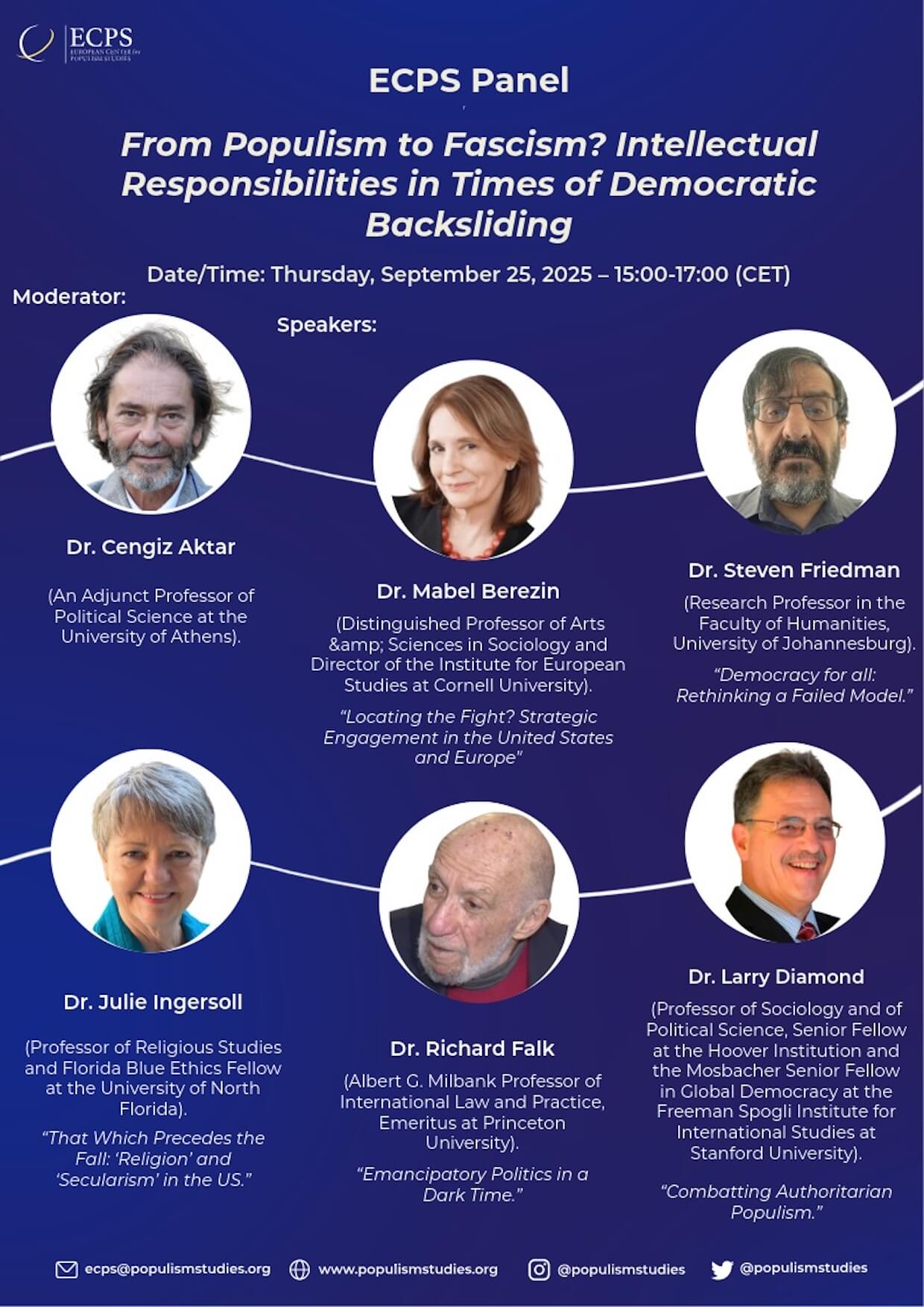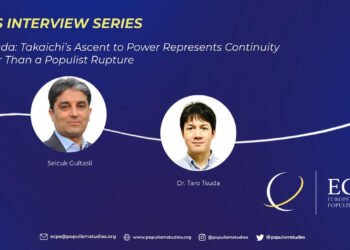Date/Time: Thursday, September 25, 2025 – 15:00-17:00 (CET)
Click here to register!
Moderator
Dr. Cengiz Aktar (An Adjunct Professor of Political Science at the University of Athens).
Speakers
"Locating the Fight? Strategic Engagement in the United States and Europe," by Dr. Mabel Berezin (Distinguished Professor of Arts & Sciences in Sociology and Director of the Institute for European Studies at Cornell University).
“Democracy for all: Rethinking a Failed Model,” by Dr. Steven Friedman (Research Professor in the Faculty of Humanities, University of Johannesburg).
"That Which Precedes the Fall: ‘Religion’ and ‘Secularism’ in the US," by Dr. Julie Ingersoll (Professor of Religious Studies and Florida Blue Ethics Fellow at the University of North Florida).
“Emancipatory Politics in a Dark Time,” by Dr. Richard Falk (Albert G. Milbank Professor of International Law and Practice, Emeritus at Princeton University).
“Combatting Authoritarian Populism,” by Dr. Larry Diamond (Professor of Sociology and of Political Science, Senior Fellow at the Hoover Institution and the Mosbacher Senior Fellow in Global Democracy at the Freeman Spogli Institute for International Studies at Stanford University).
Click here to register!

Brief Biographies and Abstracts
Moderator
Dr. Cengiz Aktar is an adjunct professor of political science at the University of Athens and a former UN director specializing in asylum policies. A leading advocate of Turkey’s EU integration, he has been active in major civil initiatives, including Istanbul’s European Capital of Culture bid and the “European Movement 2002.” His research focuses on EU integration, refugee law, political centralism, and the politics of memory concerning ethnic and religious minorities.
Speakers
Locating the Fight? Strategic Engagement in the United States and Europe
Dr. Mabel Berezin is Distinguished Professor of Sociology and Director of the Institute for European Studies at Cornell University. A comparative sociologist, her work examines challenges to democracy, nationalism, and populism in Europe and the United States. She is the author of Making the Fascist Self, Illiberal Politics in Neoliberal Times, and co-editor of Europe without Borders. Her forthcoming book, The End of Security and the Rise of Populism (Oxford University Press), explores the global resurgence of nationalism and its implications for democratic practice.
Abstract: Democratic backsliding in its various authoritarian forms is a global phenomenon that demands a response in the academy and beyond. This talk will argue that the threat to democracy varies depending on national context and the struggle to overcome these threats will depend on specific political histories.
Democracy For All: Rethinking a Failed Model
Dr. Steven Friedman is Research Professor in the Humanities Faculty at the University of Johannesburg. A political scientist, he has written extensively on South Africa’s transition to democracy and more recently on the relationship between democracy, inequality, and economic growth. He is the author of numerous books and articles on democratic theory and practice and writes Against the Tide, a weekly column in Business Day on current political trends.
Abstract: I will argue that democracy is currently threatened because the model of democracy which has reigned over the past three decades has made the current backlash against it inevitable. While the model has, rightly, insisted on the need for citizens to hold public power to account, it has ignored the need to do the same to private power. This has handed excessive power to the wealthy and has left citizens at their mercy. While proclaiming democracy as a universal system which enables all human beings to exercise choice, it associates democracy with Western-ness. This has weakened its appeal outside the West and left it unable to cope with racial and religious diversity within it. The solution is a democracy which recognises the need to restrain private and public power and is unabashedly universal.
That Which Precedes the Fall: ‘Religion’ and ‘Secularism’ in the US
Dr. Julie Ingersoll is Professor of Religious Studies and Florida Blue Ethics Fellow at the University of North Florida. She is a foremost scholar of Christian Reconstructionism, a 20th century movement that underpins much of today’s Chrisitan Nationalism. She is author of Building God’s Kingdom: inside the world of Christian Reconstruction and Evangelical Christian Women:: war stories on the Gender Battles. She has written broadly on religion and politics, religion and violence and related topics.
Abstract: I’ll discuss how seemingly contradictory social movements (both “religious” and “secular” share immediate, earthly concerns, values, and perspectives that have brought them together in the US despite their differences. As factions they have been dismissed as “fringe” groups, but I’ll show why what they share matters more than their differences, and how combined they’ve become a profound threat to democracy.
Emancipatory Politics in a Dark Time
Dr. Richard Falk is Albert G. Milbank Professor of International Law and Practice, Emeritus, at Princeton University, and former Visiting Distinguished Professor in Global and International Studies at the University of California, Santa Barbara. A leading scholar of international law and global governance, he has served on the Independent International Commission on Kosovo and on the editorial boards of The Nation and The Progressive. He is also Chair of the Board of the Nuclear Age Peace Foundation.
Abstract: I will explain briefly why authoritarianism has flourished, and seems trending toward fascism in many parts of the world. My main attempt will be to argue that an emancipatory political future for the Global West seems ‘impossible,’ but that the impossible happens (e.g. Mandela release, Soviet collapse, Arab Spring) and the future unknowable, making it rational for those of democratic and progressive inclination to struggle for what they believe. The alternative of silence in the face of evil in such a convulsive period is as Gramsci put is to nourish ‘monsters.’ I want to insist that at such historical and political crisis ‘angels’ can also emerge.
Combatting Authoritarian Populism
Dr. Larry Diamond is a senior fellow at the Hoover Institution and the Freeman Spogli Institute for International Studies at Stanford University, where he leads programs on global democracy, Arab reform, and Taiwan in the Indo-Pacific. He is founding co-editor of the Journal of Democracy and a senior consultant at the National Endowment for Democracy. His research focuses on democratic trends, challenges, and reforms worldwide. His most recent book, Ill Winds: Saving Democracy from Russian Rage, Chinese Ambition, and American Complacency, examines threats to liberal democracy and strategies to defend it.
Abstract: This talk will explain how and why authoritarian populists gain power and seek to expand it to erode or destroy democracy, and how democratic forces can resist this project.


